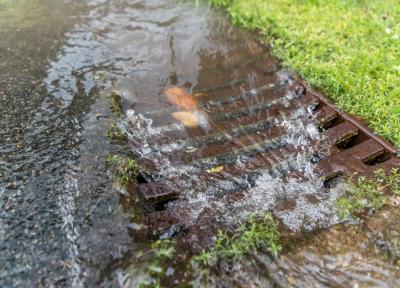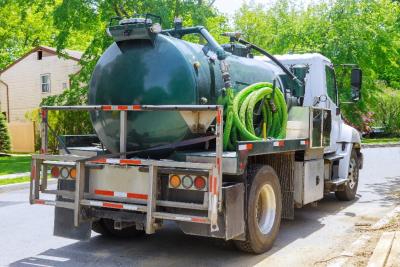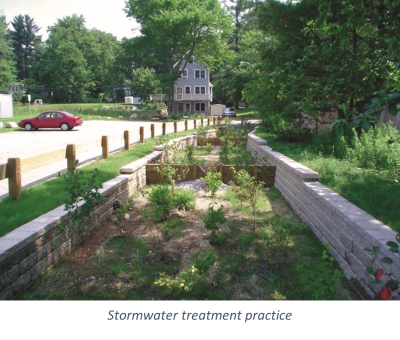Stormwater Center
ROCHESTER'S STORMWATER MANAGEMENT PROGRAM:
What is Stormwater?
 Stormwater is water from a weather event in the form of rain or snow melt. Stormwater may be absorbed into the ground, or it may travel across (runoff) the land surface into a nearby lake, stream, or estuary, which can be referred to using the term “water bodies.” There usually is not a substantial amount of stormwater runoff from natural land (land with vegetation, such as plants, shrubs, trees, and grass) because most rain or snow melt sinks into the ground or evaporates. Also, in most natural areas, stormwater is filtered by the land before it reaches nearby water bodies. In developed areas, stormwater acts very differently. Much of the stormwater doesn’t get absorbed into the land because the land area is covered by streets, parking lots, and rooftops (which are impervious surface covers). Therefore, there is more stormwater runoff from developed areas than the natural areas, and the impervious surface covers don’t filter the stormwater runoff. The stormwater becomes polluted from oil, grease, lawn pesticides, pet waste, trash, and bacteria as it moves across the surfaces. This polluted stormwater can then enter Rochester’s water bodies. Many water quality issues in water bodies are directly related to stormwater runoff. To learn more, click here for a video on Stormwater Runoff
Stormwater is water from a weather event in the form of rain or snow melt. Stormwater may be absorbed into the ground, or it may travel across (runoff) the land surface into a nearby lake, stream, or estuary, which can be referred to using the term “water bodies.” There usually is not a substantial amount of stormwater runoff from natural land (land with vegetation, such as plants, shrubs, trees, and grass) because most rain or snow melt sinks into the ground or evaporates. Also, in most natural areas, stormwater is filtered by the land before it reaches nearby water bodies. In developed areas, stormwater acts very differently. Much of the stormwater doesn’t get absorbed into the land because the land area is covered by streets, parking lots, and rooftops (which are impervious surface covers). Therefore, there is more stormwater runoff from developed areas than the natural areas, and the impervious surface covers don’t filter the stormwater runoff. The stormwater becomes polluted from oil, grease, lawn pesticides, pet waste, trash, and bacteria as it moves across the surfaces. This polluted stormwater can then enter Rochester’s water bodies. Many water quality issues in water bodies are directly related to stormwater runoff. To learn more, click here for a video on Stormwater Runoff
Why Do We Manage Stormwater?
It is important to manage stormwater runoff not only to help prevent pollutants from entering our water bodies, but also to help prevent soil erosion and flooding. Important federal and state laws, such as the Clean Water Act and the Safe Drinking Water Act, are in place to protect water quality in our rivers, streams, and groundwater. These laws require us to manage the stormwater runoff created by our urban environment to protect all surface waters and groundwater.
Under the National Pollution Discharge Elimination System (NPDES), Municipal Separate Storm Sewer System (MS4) Permit, issued by the United States Environmental Protection Agency, Rochester is required to have a stormwater management program (SWMP) in place and engage in practices to control polluted stormwater runoff from property that the City owns and maintains, which includes roadways.
National Pollution Discharge Elimination System (NPDES), Municipal Separate Storm Sewer System (MS4) Permit, issued by the United States Environmental Protection Agency, Rochester is required to have a stormwater management program (SWMP) in place and engage in practices to control polluted stormwater runoff from property that the City owns and maintains, which includes roadways.
Rochester's Department of Public Works Stormwater Division works with residents, businesses, and communities to manage stormwater in Rochester to protect water quality, public health, and the environment.
How Do We Manage Stormwater?
The City has a Stormwater Management Program (SWMP) to manage its stormwater runoff. A significant part of the program is the actual storm drain network that is set up throughout the city to capture and direct stormwater. This storm drain network is publicly owned systems are known as municipal separate storm sewer systems or MS4s. The Rochester system includes catch basins,manholes, stormwater treatment practices(ponds, bioretention, tree filters, etc.) and outfalls (pipes that discharge directly to water bodies). The storm drain infrastructure includes 5,000 catch basins, 860 drain manholes, 165 outfalls, 35 culverts, 800,000 feet of drainpipes, and over 75 stormwater treatment practices. As a system, these assets manage runoff within the city by directing flow away from developed areas to reduce the impacts of stormwater runoff on water quality and aquatic habitat.
 The stormwater management infrastructure (MS4) in place within the city needs to have a federal MS4 permit has requirements that the City needs to meet to keep it up to date and in compliance with federal regulations. The City's SWMP includes information and details about the activities and measures that are planned for meeting the minimum requirements of the MS4 permit, which became effective on July 1, 2018. The main elements of the SWMP include(1) a public education program to provide material describing ways the city's residents can minimize stormwater contamination, (2) an opportunity for the public to participate and provide comments on the stormwater program, (3) a program to identify and eliminate prohibited discharges within the MS4, (4) a program to control construction site stormwater discharges to the MS4, (5) a program to control stormwater runoff from development projects using stormwater control measures, and (6) a good housekeeping program to minimize stormwater pollution sources on municipal properties and from municipal operations.
The stormwater management infrastructure (MS4) in place within the city needs to have a federal MS4 permit has requirements that the City needs to meet to keep it up to date and in compliance with federal regulations. The City's SWMP includes information and details about the activities and measures that are planned for meeting the minimum requirements of the MS4 permit, which became effective on July 1, 2018. The main elements of the SWMP include(1) a public education program to provide material describing ways the city's residents can minimize stormwater contamination, (2) an opportunity for the public to participate and provide comments on the stormwater program, (3) a program to identify and eliminate prohibited discharges within the MS4, (4) a program to control construction site stormwater discharges to the MS4, (5) a program to control stormwater runoff from development projects using stormwater control measures, and (6) a good housekeeping program to minimize stormwater pollution sources on municipal properties and from municipal operations.
Click here to review the latest SWMP report and other stormwater documents. Comments or questions may be provided to Jarrod Norris via email at Jarrod.Norris@rochesternh.gov

